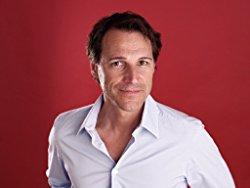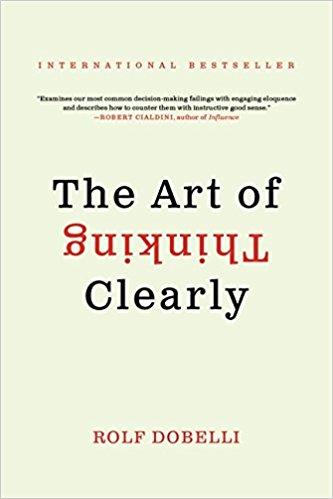The Art of Thinking Clearly Summary
<1 min read ⌚
 Better Thinking, Better Decisions
Better Thinking, Better Decisions
Even if you think yourself to be a rational thinker, you have probably faced situations when you could have chosen a better way to act than you did.
Read our summary of “The Art of Thinking Clearly”, that lists the most common cognitive errors, and realize what you have been doing wrong all this time.
Who Should Read “The Art of Thinking Clearly”? and Why?
In reality, we are all irrational.
We are prone to thinking errors, to lousy thinking habits, and we make poor choices.
But, that should not worry you too much, since it is part of the human experience.
Rolf Dobelli presents you “The Art of Thinking Clearly,” a book consisted of 99 chapters, which will acquaint you with various cognitive mistakes, such as overestimating the possibility of success or becoming overwhelmed by options.
We recommend this book to all people who want to make better choices.
About Rolf Dobelli
 Rolf Dobelli is an author, the founder of Zurich.Minds and the co-founder of getAbstract.
Rolf Dobelli is an author, the founder of Zurich.Minds and the co-founder of getAbstract.
“The Art of Thinking Clearly Summary”
Humans experience different reasoning patterns, out of which many are a barrier to logical thinking.
Most of these cognitive errors are common, which means that it is possible to identify them. Knowing what you have been and are dealing with means that you will be able to avoid similar mistakes in the future.
Now, don’t get us wrong, you are “wired” to make such mistakes, so you cannot entirely avoid them. What you can do is minimize them, and start opening yourself to more logical alternatives.
What are these cognitive errors we are talking about?
To start with, let’s talk about inspirational stories.
We all love “rags to riches” stories since they make us feel that everything is possible. But inspirational stories tend to make us think illogically since we immediately identify ourselves with those “one in a million” exceptions.
We are not saying that you are not one of the few, but you will make far better choices if you take into account all the people who falter.
But why do we get trapped into such thinking habits?
Well, it is safe to say that most people discredit information that is not in line with their beliefs.
In fact, when individuals face people who disagree with their opinions, they think of them as poorly informed idiots.
Nowadays the problem is even bigger since all around the Internet you can find materials that will reinforce your confirmation bias, regardless of its nature.
However, the next time you search the Internet hoping to find those individuals that support your opinion, keep in mind that search engines tailor the results you get, so you will not stumble upon data that is different from your views.
Furthermore, we constantly face story bias, as well.
Story bias exists since people have a hard time remembering bare facts and explain the world through stories.
As engaging as they may be, stories lead to reality distortion.
One of the stories we tell ourselves is believing we are intelligent and can make the right predictions based on our knowledge. However, we tend to overestimate ourselves, and the amount of information we have.
The world is changing all the time, and most of the time we know less than what we think we know.
Failing to face this ego-shattering fact leads to underestimating costs and length of projects. Fix this error by becoming a pessimist in terms of estimating the time and costs for some future undertaking.
Furthermore, people often confuse the message with the messenger. In other words, they judge the credibility of a certain message based on who conveys it.
Ever since ancient times people blindly believed figures that hold some sort of authority. What you need to do is question everything around you, as well as yourself.
Understand that no one can know everything. So, become one of those people who invest in your circle of competence, and do not spread your attention all over the place.
Having limits is human. The sooner you see it, the sooner you will become happier.
Key Lessons from “The Art of Thinking Clearly”
1. Outcome Bias
2. Loss Aversion and Fear of Regret
3. Alternative Blindness
Outcome Bias
Outcome bias is the tendency to assess decisions based on the results they give. However, a bad result does not necessarily mean that a decision was bad.
Every result is a sum of both decisions and external factors such as luck or timing.
Loss Aversion and Fear of Regret
Gaining something will make you happy, but losing the same thing will make you much more distressed.
It is a fact universally acknowledged that a negative emotion people suffer when facing a loss is stronger than the emotion they feel when they gain something of the same value.
Similar to loss-aversion is the fear of regret. Many people stay in their comfort zones because they are afraid that they will make a wrong decision, and be sorry for it.
Both of these fears keep you where you are, and limit your progress.
Alternative Blindness
Whenever people think about an offer, they become blind to alternatives.
However, to be able to make the right decision, you have to go out of your mental limits.
Sometimes, having too many options is a problem as well, since a wide range of options makes people feel stuck and continuously question whether they are making the right choice.
Like this summary? We’d Like to invite you to download our free 12 min app, for more amazing summaries and audiobooks.
“The Art of Thinking Clearly” Quotes
How do you curb envy? First, stop comparing yourself to others. Second, find your “circle of competence” and fill it on your own. Create a niche where you are the best. It doesn’t matter how small your area of mastery is. The main thing… Click To Tweet If your only tool is a hammer, all your problems will be nails. Click To Tweet If 50 million people say something foolish, it is still foolish. Click To Tweet There are two kinds of forecasters: those who don’t know, and those who don’t know they don’t know. Click To Tweet As paradoxical as it sounds: The best way to shield yourself from nasty surprises is to anticipate them. Click To TweetOur Critical Review
Knowing the mistakes that Rolf Dobelli lists does not mean that you will avoid them, but this book will make you question your mistakes, so you stop making them again.
Emir is the Head of Marketing at 12min. In his spare time, he loves to meditate and play soccer.


 Better Thinking, Better Decisions
Better Thinking, Better Decisions




